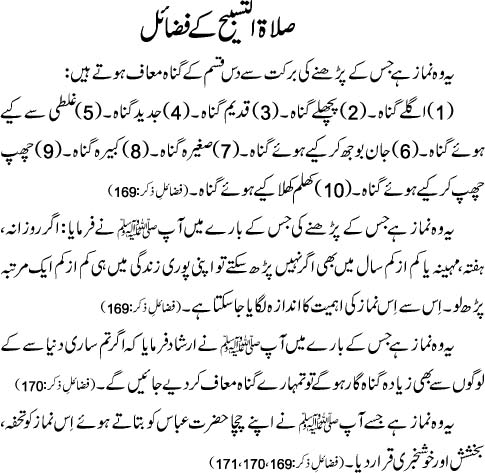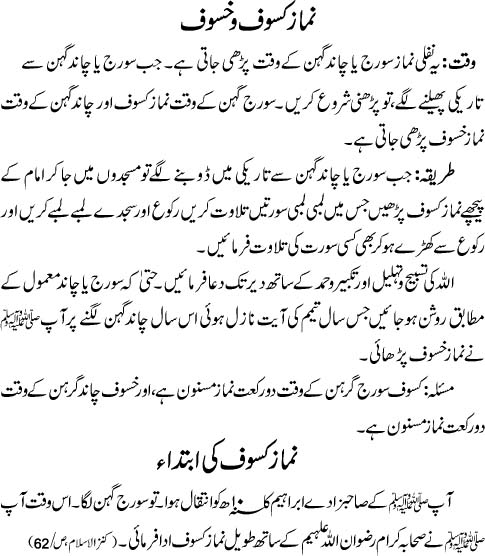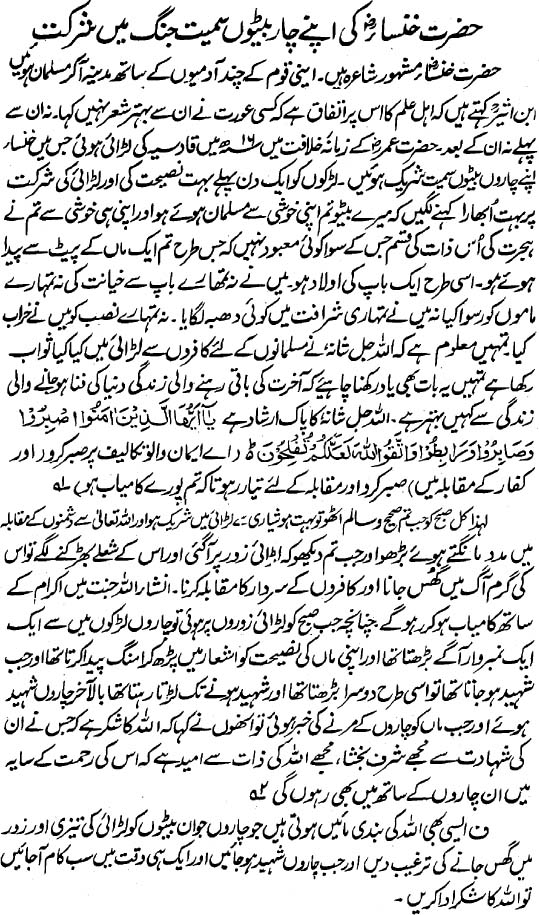
Salat-Ul-Tasbih Kay Fazail
Thee Alone We Worship
[Quran – 1:5] “Thee alone we worship and to Thee alone we pray for help.”
The Prophet (Peace Be Upon Him) has said:
[Bukhari, Book #2, Hadith #50] “Do you know what is meant by believing in Allah alone?” They replied, “Allah and His Apostle know better.” Thereupon, the Prophet said, “It means:
1. To testify that none has the right to be worshiped but Allah, and that Muhammad is Allah’s Apostle.
2. To offer prayers perfectly
3. To pay the Zakat (obligatory charity)
4. To observe fast during the month of Ramadan.
5. And to pay Al-Khumus (one-fifth of the booty to be given in Allah’s Cause).
Then he forbade them four things, namely, Hantam, Dubba,’ Naqir Ann Muzaffat or Muqaiyar; (These were the names of pots in which Alcoholic drinks were prepared) (The Prophet mentioned the container of wine, and he meant the wine itself). The Prophet further said (to them): “Memorize them (these instructions) and convey them to the people whom you have left behind.”
[Muslim, Book #001, Hadith #0023] “I direct you to affirm belief in Allah alone, and then asked them: Do you know what belief in Allah really implies? They said: Allah and His Messenger know best. The Prophet said: It implies testimony to the fact that there is no god but Allah, and that Muhammad is the messenger of Allah, establishment of prayer, payment of Zakat, fast of Ramadan, that you pay one-fifth of the booty (fallen to your lot) and I forbid you to use gourd, wine jar, or a receptacle for wine. Shu’ba sometimes narrated the word naqir (wooden pot) and sometimes narrated it as muqayyar. The Holy Prophet also said: Keep it in your mind and inform those who have been left behind.”
Namaz-e-Kasoof Aur Khasoof

Namaz-e-Kasoof Aur Khasoof
Allah’s Rewards, The Righteous, The Faithful
“Lo! men who surrender unto Allah, and women who surrender, and men who believe and women who believe, and men who obey and women who obey, and men who speak the truth and women who speak the truth, and men who persevere (in righteousness) and women who persevere, and men who are humble and women who are humble, and men who give alms and women who give alms, and men who fast and women who fast, and men who guard their modesty and women who guard (their modesty), and men who remember Allah much and women who remember – Allah hath prepared for them forgiveness and a vast reward.” [33:35]
The Prophet (Peace Be Upon Him) has said:
[Bukhari, Book #1, Hadith #1] “Narrated ‘Umar bin Al-Khattab: I heard ALLAH’s Apostle saying, “The Reward of deeds depends upon the intentions and every person will get the Reward according to what he has intended. So whoever emigrated for worldly benefits or for a woman to marry, his emigration was for what he emigrated for.”
[Bukhari, Book #2, Hadith #36] “Narrated Abu Huraira: ALLAH’s Apostle said: “Whoever establishes prayers during the nights of Ramadan faithfully out of sincere faith and hoping to attain ALLAH’s Rewards (not for showing off), all his past sins will be forgiven.”
[Bukhari, Book #2, Hadith #37] “Narrated Abu Huraira: ALLAH’s Apostle said, “Whoever observes fasts during the month of Ramadan out of sincere faith, and hoping to attain ALLAH’s Rewards, then all his past sins will be forgiven.”
Surah Al-Fatihah Ki Taseer

Surah Al-Fatihah Ki Taseer
True Piety
[Quran: 3:92] “By no means shall ye attain righteousness unless ye give (freely) of that which ye love; and whatever ye give, of a truth Allah knoweth it well.”
[Bukhari, Book #2, Hadith #44]
The Prophet (Peace Be Upon Him) has said: “Narrated Talha bin ‘Ubaidullah: A man from Najd with unkempt hair came to Allah’s Apostle, and we heard his loud voice but could not understand what he was saying, till he came near, and then we came to know that he was asking about Islam. Allah’s Apostle said, “You have to offer prayers perfectly five times in a day and night (24 hours).” The man asked, “Is there any more (praying)?” Allah’s Apostle replied, “No, but if you want to offer the Nawafil prayers (you can).” Allah’s Apostle further said to him: “You have to observe fasts during the month of Ramadan.” The man asked, “Is there any more fasting?” Allah’s Apostle replied, “No, but if you want to observe the Nawafil fasts (you can.)” Then Allah’s Apostle further said to him, “You have to pay the Zakat (obligatory charity).” The man asked, “Is there anything other than the Zakat for me to pay?” Allah’s Apostle replied, “No, unless you want to give alms of your own.” And then that man retreated, saying, “By Allah! I will neither do less nor more than this.” Allah’s Apostle said, “If what he said is true, then he will be successful.
Qayamat Kay Ahwal Hadith Ki Roshni Mein

Qayamat Kay Ahwal Hadith Ki Roshni Mein
Islamic Tarbiyyah Of Children
In the tarbiyyah of children, you should remember that children often learn from example. The proper conduct and example of parents are crucial in the upbringing of children.
Parents who expect their children to be disciplined and to work hard must themselves be disciplined and work hard. Parents who expect their children to be truthful must not be in the habit of telling lies.
Also, it is important to remember that the treatment given to children in the early years of their life can have far-reaching effects on their mental and emotional state later on in life.
In the tarbiyyah of children, you should try to remember that:
Children should be happy and cheerful. And have a zest for life and living. They should be able to feel something of the carefree joy and excitement of growing up, especially before they are mukallaf. They should not be battered and terrorized.
They should be trained to grow up with the attitudes and habits, the adab or etiquette of Islam: “Be generous, kind and noble to your children and make their habits and manners good and beautiful (Akrimuu awlaadakum was ahsinuu adabahum),” said the noble Prophet (sallAllahu alayhi wasallam).
Among the virtues and habits they should develop are:
- The habit of being honest and truthful;
- The habit of being gentle and polite, for according to the noble Prophet (sallAllahu alayhi wasallam), “Gentleness adorns everything” without being timid, afraid, and cowed down;
- The habit of being helpful and considerate without being loutish in their behavior to others.
- The habit of being clean and neat and tidy, of looking after their hygiene and appearance.
Children need to develop the adab or the etiquette of Islam: when and how to greet; how to speak, sit, eat, and how to perform natural functions like personal toilet cleanly and efficiently as taught by the beloved Prophet (sallAllahu alayhi wasallam); to do everything in the manner, time and place that is appropriate for it, for example: to be reverent in salat, attentive in class, robust and full of zeal in play.
Children need to develop physical fitness and skills, to be strong and courageous. The Prophet (sallAllahu alayhi wasallam) recommended that children be taught horse riding, swimming, and archery.
One Muslim ruler once suggested that his child be taught swimming before reading or writing because someone else may read and write for him, but no one can swim for him!
From the noble Prophet (sallAllahu alayhi wasallam)’s recommendations, we see that children need to lead an active outdoor life and be proficient in some of the martial arts. They should have the stamina for demanding play and demanding work. This implies at least that they should be adequately fed.
Children need to develop a thirst for knowledge, beneficial knowledge through listening, observation, reading, and interacting with others. It is recommended that children be taught from an early age to recite and read the Quran and develop a love for it. At an early age, they have the capacity to memorize it, and it is common for many children and youths to memorize the whole or large parts of the Quran.
From the age of seven, the Prophet (sallAllahu alayhi wasallam) recommended that children should get in the habit of performing salat, and by the age of ten, they should be required to do so regularly.
Children need to develop skills and be creative and inventive. They should be trained from an early age to take on responsibilities, to organize and take initiative, rather than be timid and submissive. They should be able to spend their time usefully and profitably.
They need to develop skills that would fit them for contemporary living and for the particular society in which they live. This may involve anything from the skills of running an efficient and creative home to the skills that would enable them to earn a living and help them in the process of tarbiyyah when their turn comes. Give a person a fish, and you feed just one person; teach a person to fish, and he can feed hundreds, says an apt Chinese proverb.
Above all, correct tarbiyyah should ensure that children develop a love for Islam, a love for Allah and His Prophet (sallAllahu alayhi wasallam), and that they develop a feeling of pride in being Muslim and a willingness to strive for the good of others.
They need to realize the benefits of Islam, the foundations on which it is based, and their need for Islam. They need to value Islam and live by Islamic values.
Abdul Wahid Hamid
from Islam: The Natural Way
- August, 14
- 870
- Human Rights
- More
Al-Khansa RA Ki Apne Charo Betoon Kay Sath Jang Mein Shirkat

Al-Khansa RA Ki Apne Charo Betoon Kay Sath Jang Mein Shirkat
Excel In Seeking Allah’s Forgiveness
[Allah’s Quran – 3:133] “And vie one with another for forgiveness from your Lord, and for a paradise as wide as are the heavens and the earth, prepared for those who ward off (evil);”
Emulate the Prophet’s Example:
[MUSLIM, Book #004, Hadith #0984] “Aisha reported: The Messenger of Allah (may peace be upon him) often recited these words: Hallowed be Allah and with His praise, I seek the forgiveness of Allah and return to Him. She said: I asked: Messenger of Allah, I see that you often repeat the saying” subhan Allahi bihamdihi astag firullahi watubuilaih” whereupon he said: My Lord informed me that I would soon see a sign in my Ummah, so when I see it I often recite (these) words: Hallowed be Allah and with His Praise, I seek forgiveness of Allah and return to Him. Indeed, I saw it (when this verse) was revealed:” When Allah’s help and victory came, it marked the victory of Mecca, and you see people entering into Allah’s religion in troops, celebrate the praise of Thy Lord and ask His forgiveness. Surely He is ever returning to Mercy.”

